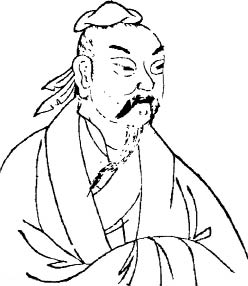| Zhuangzi: Wandering in Selfless Ease
By WEN HAIMING
ZHUANGZI (ca. 369-286 B.C.), or Chuang-tzu, was an influential Taoist thinker from State Song (encompassing parts of today’s Shandong and Henan provinces) during the Warring States Period (475-221 B.C.). He made his living weaving straw sandals before becoming a low-ranking official. Though in economic distress for much of his life, the great philosopher was convinced that people should be resigned to the natural order of things and stay free of worldly concerns.
Zhuangzi is credited with writing the masterpiece named after him: Zhuangzi, which, with its luscious, figurative language and pithy, inspiring tales laden with wider connotations, has been one of the most loved philosophical treatises in Chinese history. Zhuangzi employs every resource of rhetoric in his writing to persuade people to free themselves from societal bondage, which is exactly the opposite position taken by Confucianism. A true Confucian is obliged to get actively involved in world affairs, but Zhuangzi encouraged people to stay aloof from politics and earthly obsessions, which he saw as shackles to a free and noble mind. He therefore urged people to understand human limitations and “wander” through their lives.
 |
|
An ancient portrait of Zhuangzi. |
Carefree Wandering
Zhuangzi was aware that people actually have no way of escaping social intercourse or power structures or of transcending all interests and agendas. His solution to the dilemma was “no-self,” or no sense of self. In the first chapter of his book Free and Easy Wandering, Zhuangzi says that a care free existence requires goal-free “wandering,” and that is the focal point of his philosophy.
Zhuangzi recommends people take an easy stroll, metaphorically of course, throughout life and remain above common concepts of life and death. He argued that a human life is a transformative process and a recycling of natural qi; and in this respect we are just like all other life forms in the universe, such as grass and trees. This philosophy holds we are ourselves greater than our immediate concerns in life and should not be overly driven by them.
When Zhuangzi’s wife died, his good friend Hui Shi went to express his condolences, only to find Zhuangzi drumming a clay pot and singing. Hui Shi asked Zhuangzi how he could be so heartless. Zhuangzi said that he was sad at first when his wife died, but soon realized that she came into the world as the result of intangible qi becoming tangible. When she sighed her last breath, she merely melted back into qi. The whole process of life seemed to him a cycle of being and non-being not much different from the transitions of the four seasons. Zhuangzi hence suggests that human beings go with the flow of these natural rhythms since mankind is also part of nature.
There are a good number of renowned hermits in Chinese history, but many actually retreated into reclusion only to bide their time until conditions were right for them to get back to affairs of state in a more advantageous position and they closely surveyed the political landscape from the protection of their temporary retirement. Zhuangzi was not one of these.
Zhuangzi was fishing when King Wei of State Chu sent him two envoys with a load of gifts, and the offer to make him prime minister. But Zhuangzi held his fishing pole steady and, without turning his head, asked: “I have heard that the king keeps in his ancestral temple the shell of a sacred and ancient tortoise. Which way do you think the tortoise would feel happier, dead and being worshiped or alive and dragging its tail in the muddy water?” For one such as Zhuangzi, it is proper to resist the temptations of power, for worldly power is nothing compared to a carefree life and unfettered mind.
Equality and Human Relationship with the World
Zhuangzi believed that all beings are equal and all happenings essentially indistinct. The perceived variety and disparities among them are merely relative, for they are tied to one’s perspective. Hence, being and non-being, true and false are all determined by subjective judgment. Zhuangzi concluded, “Heaven and earth co-exist with me and everything between them, including me, is alike.”
Zhuangzi also recognized however the respective natures of different lives. He makes the point that sparrows can’t understand why eagles bother to fly so far and so high. It is in fact the contrasts and nuances of our inner natures that distinguishes each of us from the other, and gives the world its richness and complexity. On these grounds, Zhuangzi felt that people should respect these distinctions, celebrate a lack of uniformity and refrain from forcing their views on others.
| 